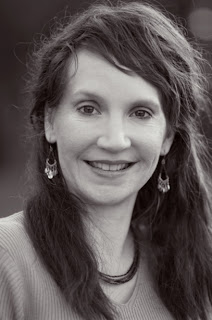
My favorite author, Madeleine L'Engle, died just a few days ago.
I first "met" her through her book A Wrinkle in Time, the Newbery Award-winning work that was rejected by many publishers and later became one of the best-selling children's books of all time. It was also banned in some circles.
I met L'Engle in person once when I was teaching high school in Queens. Asked to speak to a group of teachers, L'Engle agreed and requested only cab fare from her Manhattan home to Queens and back.
She spoke about imagination and faith. She spoke about how some institutions, particularly schools and churches, sometimes make the mistake of killing, rather than encouraging, imagination. She signed one of my favorite books of hers: Walking on Water--Reflections on Faith and Art.
She inscribed my book with her autograph and the words, "A song on the walk."
I have purchased and read many of her books over the years. Hers were always the books I wanted to have for my own rather than borrow from the library, even with an admittedly limited budget.
I even read her very first (published) novel, The Small Rain, in which I could see how first efforts, though often good, are not usually as great as later artistic efforts.
In some way, reading an author's works over time and identifying with the characters in them helps me feel as if I really know the author--and perhaps, in some way, I do. Like many readers, I expect, I feel like I have lost a friend.
The written words I remember best of L'Engle's come from Walking on Water, and they follow her discussion of being reluctant to classify herself as a "Christian writer," while at the same time refusing to deny her faith. In an interview, she once said that rather than being labeled "Christian writer," she preferred to be called, "A writer who struggles to be Christian."
For a writer, semantics matter.
She wrote about how she saw Bach as the consummate artist of Christian faith, and how his work, "Oh, Sacred Head Now Wounded," was based on a common street song.
"There is nothing so secular that it cannot be sacred," L'Engle wrote, explaining her dislike of the division of art between "Christian art" and "non-Christian art."
I believe she saw writing as her calling, like any other calling, and perhaps she thought that just as a plumber who struggles to be Christian would not need to limit himself or herself to working only on church basement sinks, so the writer who struggles similarly need not write only about what some think of as "Christian" topics.
She wrote also about how every artist feeds into a great stream, a flood, really, of creative work, and how every work is important. Some artists, she wrote, may produce more and more lasting work. Others may produce only a trickle. Each artist's work, though, is important.
And, she wrote, “We have to be braver than we think we can be, because God is constantly calling us to be more than we are, to see through plastic sham to living, breathing reality, and to break down our defenses of self-protection in order to be free to receive and give love.”
L'Engle wrote about the artist as one who, in being brave, becomes a servant--the artist as someone who has to get out of the way and let the work speak through him or her, whether that work is a book, a song, a painting, or a photograph.
As a long-time friend of mine wrote yesterday, L'Engle is surely someone about whom it can be said, "Well done, thou good and faithful servant."
I am glad she served her works (and through them, her God), as she put it. She gave many of us enduring songs we'll sing on the walk.
